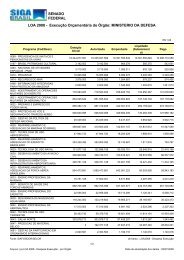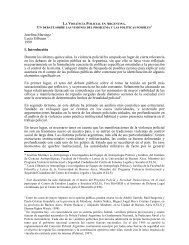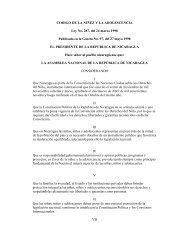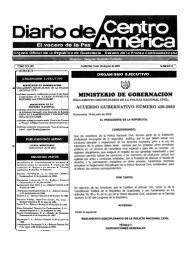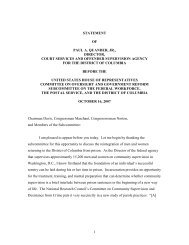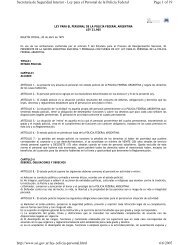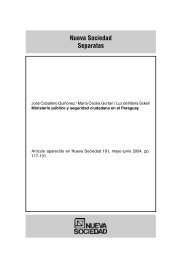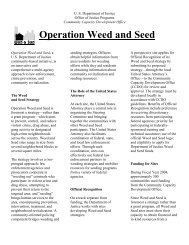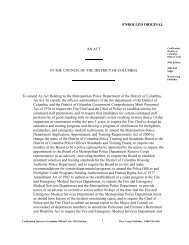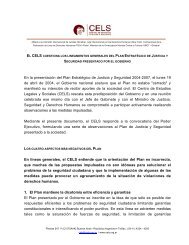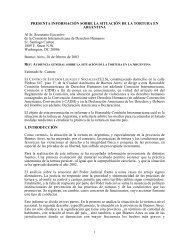Venezuela: The Life and Times of the Party System - Political ...
Venezuela: The Life and Times of the Party System - Political ...
Venezuela: The Life and Times of the Party System - Political ...
You also want an ePaper? Increase the reach of your titles
YUMPU automatically turns print PDFs into web optimized ePapers that Google loves.
<strong>of</strong> behavior can also be observed within <strong>the</strong> electorate: abstention grows <strong>and</strong> political<br />
preferences diversify as one moves from <strong>the</strong> national to <strong>the</strong> local level. Although smaller parties<br />
<strong>and</strong> factions have attempted to exploit new electoral opportunities with great vigor, <strong>the</strong> electorate<br />
as a whole has reacted to <strong>the</strong> changes with apathy. <strong>The</strong> party system has become more<br />
complex, <strong>and</strong> patterns <strong>of</strong> competition <strong>and</strong> conflict are not as predictable as <strong>the</strong>y once were.<br />
Intraparty competition has been promoted by <strong>the</strong> preference voting system, which in effect gives<br />
<strong>the</strong> electorate a key role as referee <strong>of</strong> <strong>the</strong>se disputes. At <strong>the</strong> same time, interparty conflict can<br />
now proceed on different tracks at different levels, for example with parties <strong>and</strong> voters in local or<br />
regional contests making electoral agreements independent <strong>of</strong> national considerations.<br />
Assessing <strong>the</strong> Reforms<br />
Some <strong>of</strong> <strong>the</strong> electoral reforms undertaken in recent years have posed unanticipated<br />
problems for <strong>the</strong> political order. For reforms to take root, a number <strong>of</strong> changes must be made<br />
simultaneously in various aspects <strong>and</strong> levels <strong>of</strong> <strong>the</strong> system. One key aspect <strong>of</strong> this change is<br />
represented by <strong>the</strong> modification <strong>of</strong> <strong>the</strong> Ley de Partidos Políticos in ways that seek to make party<br />
organizations more participatory <strong>and</strong> more fully subject to democratic control.<br />
Two key points are likely to affect <strong>the</strong> stability <strong>of</strong> <strong>the</strong> <strong>Venezuela</strong>n political system in <strong>the</strong><br />
short to medium term. <strong>The</strong> first is <strong>the</strong> erosion <strong>of</strong> credibility <strong>and</strong> legitimacy enjoyed by <strong>the</strong> political<br />
parties, which carries over into a more general disillusionment with <strong>the</strong> political system. <strong>The</strong><br />
second is <strong>the</strong> deterioration in <strong>the</strong> quality <strong>of</strong> life <strong>of</strong> much <strong>of</strong> <strong>the</strong> <strong>Venezuela</strong>n population. How much<br />
<strong>the</strong>se reforms can contribute to reversing <strong>the</strong>se trends remains an open question. So far, in an<br />
environment increasingly hostile to ‘traditional parties,’ <strong>the</strong>se parties have been unwilling or<br />
unable to respond successfully. Meanwhile, new formulas for inter- <strong>and</strong> intraparty cooperation<br />
(<strong>and</strong> conflict) are emerging.<br />
Reform efforts <strong>of</strong>ten assume that <strong>the</strong> basic pillars upon which <strong>the</strong> party system was built<br />
will remain solid, such that modifications will simply improve <strong>the</strong> status quo. But if one or more <strong>of</strong><br />
<strong>the</strong>se pillars, such as <strong>the</strong> nonpolarized nature <strong>of</strong> ideological debate, should change, reform could<br />
ultimately weaken <strong>the</strong> system in significant ways, creating unintended, but none<strong>the</strong>less real<br />
problems <strong>of</strong> governability <strong>and</strong> political stability.<br />
We have already noted <strong>the</strong> tendency toward divergent voting patterns at <strong>the</strong> executive<br />
<strong>and</strong> legislative levels. This tendency is likely to grow in <strong>the</strong> future, making it harder to build <strong>the</strong><br />
legislative alliances necessary to govern. In <strong>the</strong> past, <strong>the</strong> political system has adjusted<br />
successfully to situations where <strong>the</strong> party in power did not have a congressional majority. But in<br />
a contest where new agents <strong>of</strong> political power are being created <strong>and</strong> in which <strong>the</strong>re exists an<br />
uneven balance <strong>of</strong> political forces between <strong>the</strong> national <strong>and</strong> regional levels, political power may<br />
fragment, resulting in a systemic incapacity to produce governing alliances. <strong>Party</strong> discipline <strong>and</strong>



